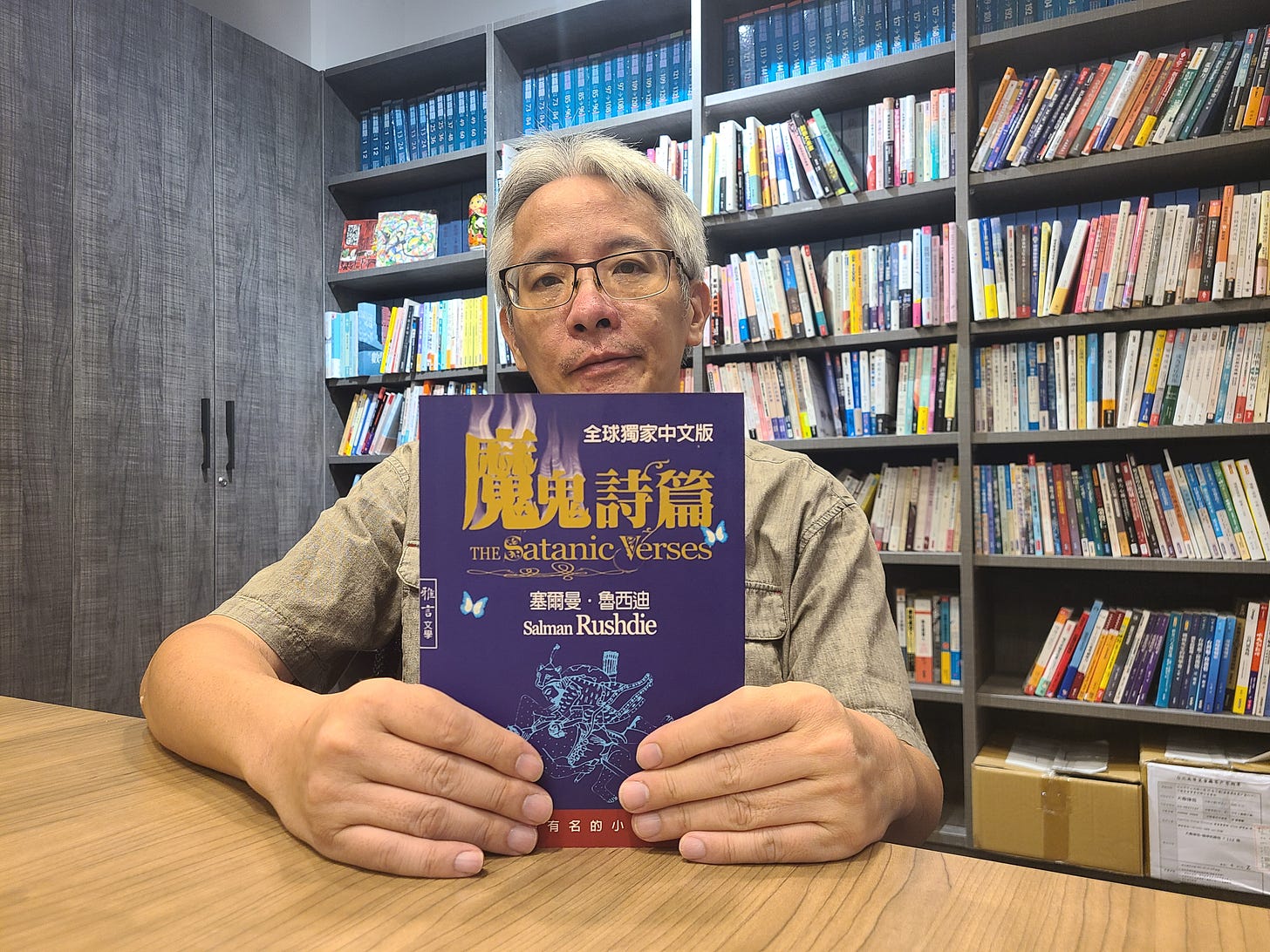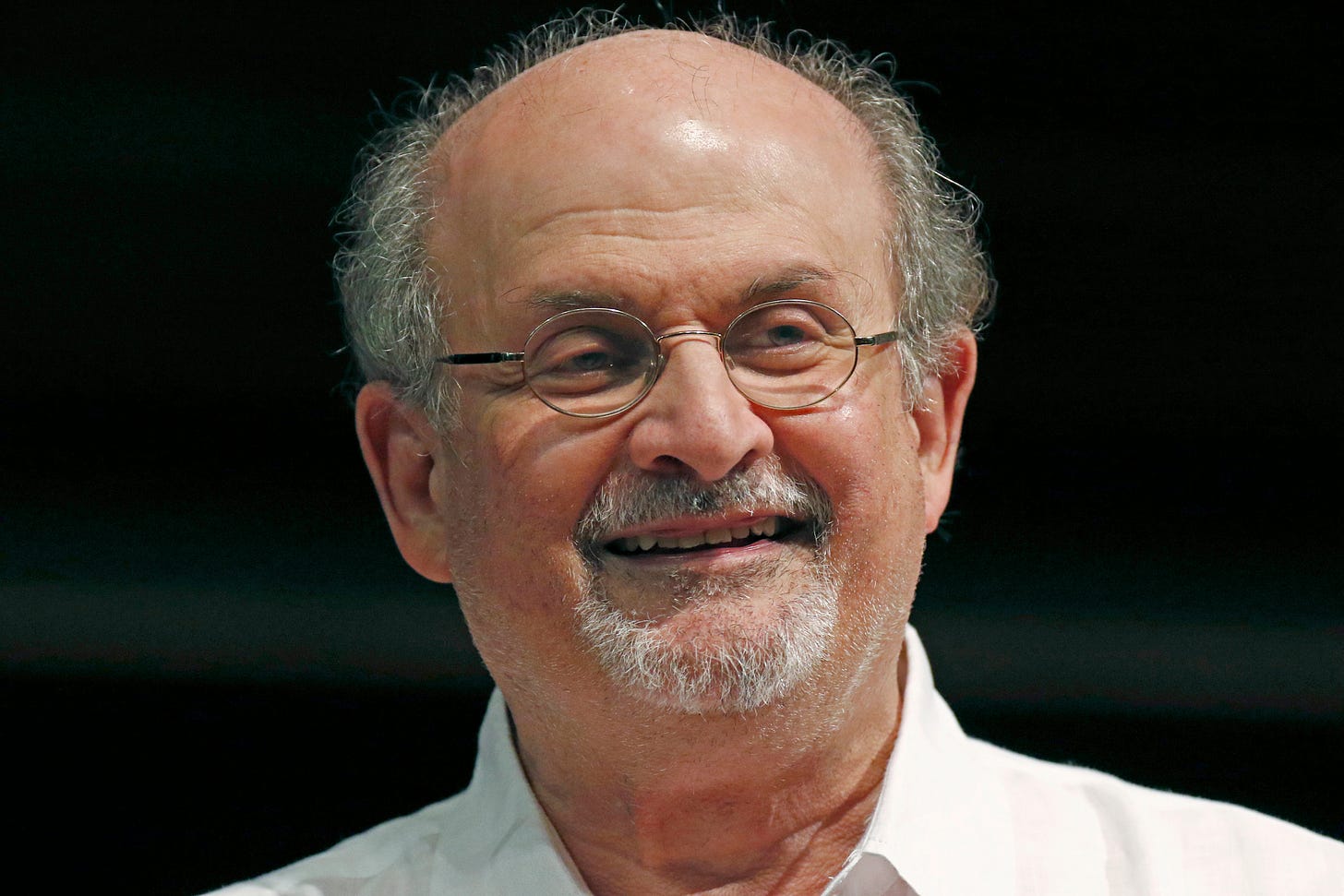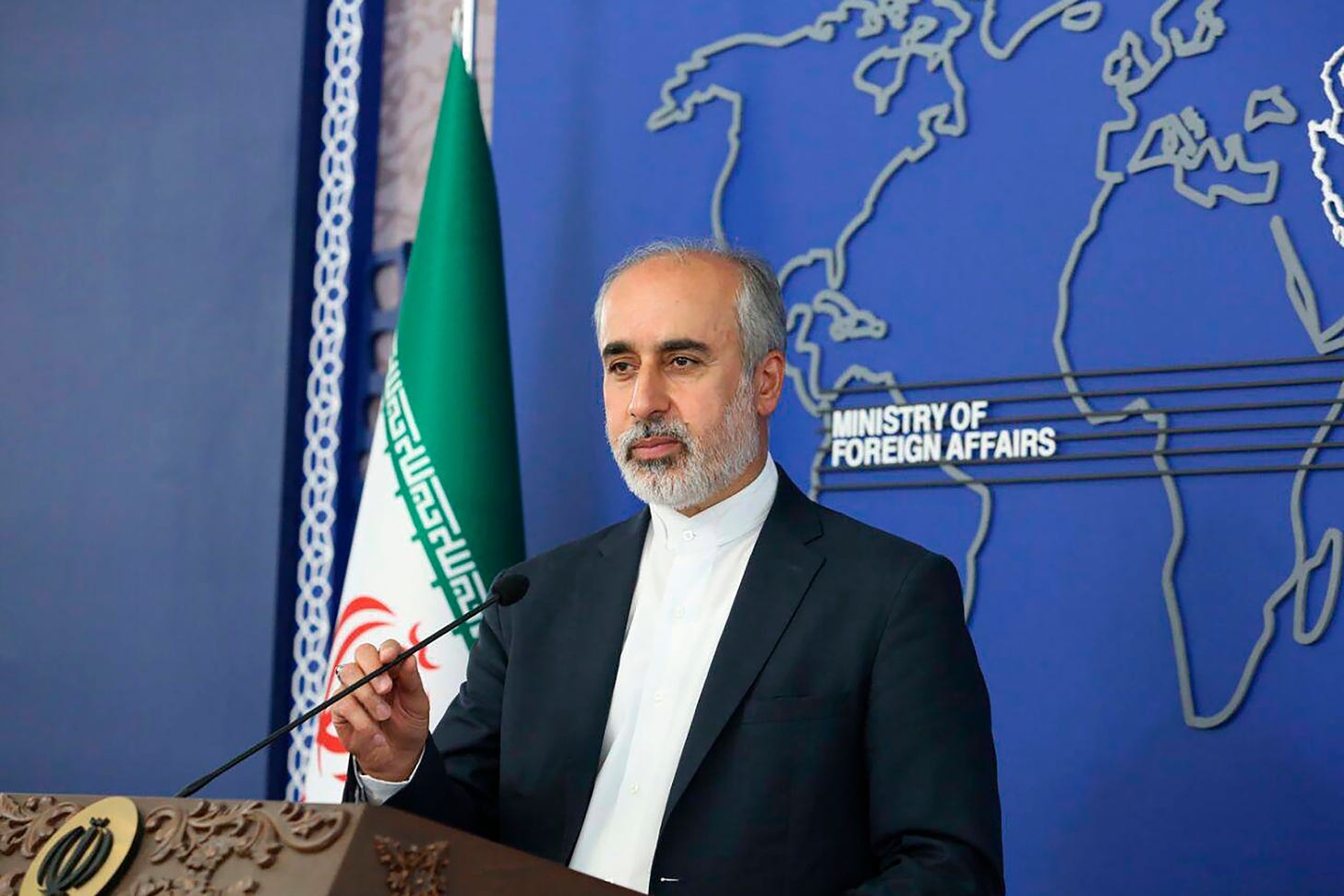Original link: https://sehseh.substack.com/p/f19
In the middle of the night on August 12, 2022, the Indian-born British and American novelist Salman. Salman Rushdie was assassinated in New York State. According to Reuters, the suspect in the attack was Hadi Matar , a 24-year-old man from New Jersey, a second-generation Lebanese immigrant who is a Shiite Muslim; Li Nan’s parents’ hometown, which is also the home of the radical/terrorist organization Hezbollah, may have been radicalized there.
When news of Rushdie’s assassination broke, I was busy wrapping up a collective translation, a collection of speeches by an international figure. At this point, it has been 20 years since I translated Rushdie’s novel The Satanic Verses .
The year after 9/11, I translated The Devil’s Psalm
I remember one fine afternoon in the spring of 2002, when my then-wife and I went shopping in town. Suddenly, I got a call from a publisher asking if I would like to translate a magical realism novel, very classic, but also very controversial and very taboo.
When I heard the author’s name and the title of the book, I was startled, and a fierce tug-of-war began immediately in my heart.
Rushdie’s classic book, The Devil’s Psalm, was published in September 1988. In the book, two characters allude to the Islamic prophet Muhammad and the angel Gibreel (Gabriel), and contain “Devil temptation”. The plot of the Prophet and the theme of questioning the “oracle” of the Koran are considered blasphemous by many Muslims and have sparked waves of demonstrations and riots. On February 16, 1989, Rushdie was even ordered to kill by the then supreme leader of Iran , Ruhollah Khomeini .
At that time, I, as a translator, had already published two translations: Edward W. Said’s Shaded Islam and Gordon G. Chang’s China Is About to Collapse; the former is still Classic, the latter seems like a prophecy that will never be fulfilled. I have rough translation experience, and I have received some affirmations, but I have never dealt with novels, which is a scruple.
The second scruple is that I have never been a “professional translator”. At that time, not only did I have another full-time job, but I also had many candles burning: during the day I was a lecturer in Chinese at a technical college in Taipei and the teaching team leader of the General Education Center; at night, I was a translator at the International News Center of China Times. So, where is the time?
In addition, from 1991 to 1993, the Italian translator, Japanese translator, Turkish publisher, and Norwegian publisher were attacked successively, and the Japanese translator Igarashi Igarashi was killed . The unsolved case remains unsolved. At the time, I was married, my parents were still alive, and I had three children. It seemed unfit to be a “martyr” to witness freedom of speech, expression, and the press. This was the third scruple.
Thinking of this, it seems like it’s time to back off. However, for a person who loves translation work, Rushdie’s “The Devil’s Psalm” is a temptation of high magic.
At that time, less than a year after the 9/11 terrorist attacks and the global war on terror, the “c” lash of civilizations advocated by the conservative political scientist Samuel P. Huntington, whom Said had harshly criticized ) jumped into a prominent school, and engaged in international journalism, which allowed me to sit in the first row of the audience in this drastic change of the century. At this moment, the translation of the Devil’s Psalm is very meaningful.
So, I picked up this novel and plunged into a few worlds I was not very familiar with, but I was very interested in: the history and legends of the beginning of Islam, the prophets, angels and devils in the Koran, Society, History and Culture of the South Asian Subcontinent (India, Pakistan) ….
The translation process is not easy. The background of this book is vast, and there is too much knowledge to make up for it. The books and online materials that can be found in a short period of time are limited, but the publisher must control the schedule. I can only fight and walk, learn now and sell now. I have benefited a lot from the annotations by Professor Paul Brians of Washington State University and the index of Professor Joel Kuortti of the University of Turku in Finland.
After a few months of hard work, the translation was released and I entered the publishing process. I also had to face a key question: under what name should I publish it?
Since Rushdie was ordered to kill him, he has been under threat to his personal safety for a long time, and received round-the-clock protection from the British police. It was not until after 1998 that the news of the killing order died down and he slowly resumed public activities. Thinking about the unfortunate events that happened in Japan and other places before, the publisher and I finally decided to publish it as “anonymous”. Although the author’s remuneration is received according to, after all, can not help but regret.
In the middle of the night on August 12, the Indian-born British and American novelist Salman. Salman Rushdie was attacked in New York State, USA, and was seriously wounded. (A)
On October 16, 2002, the Chinese version of “The Devil’s Psalm” was launched in Taiwan. Interestingly, the next day, a central-level political figure came forward to help “hit the book” ─ Kuomintang legislators He Zhihui, Jiang Qiwen, and Guo Tiancai held a press conference with great fanfare and asked the Executive Yuan Information Bureau to list this book as a “banned book” to prevent it. Taiwan was attacked by terrorists in retaliation. Although well-intentioned, in fact, ghosts are obsessed
Rushdie once said: “Its [The Devil’s Psalm] is not really about Islam, but immigration, metamorphosis, self-splitting, love, death, London and Mumbai (where Rushdie was born).”
“The Devil’s Psalm” has a huge structure, and the characters, plot, time and space, and themes are quite complex. However, many Muslims (I am afraid most of them have not actually read this book) are still obsessed with certain characters and plots in the book. Violence, on the one hand, tramples on the universal values of freedom of speech, freedom of expression, and freedom of the press, and on the other hand harms the international image of Islam again, which is truly regrettable.
In the unsolvable international conflict, Quixote who suffers for his ideals
In the post-Devil’s Psalm era, despite the precarious situation, Rushdie continued to write. He has published novels, collections of essays and children’s books, and in 2012 released his third-person memoir, “Joseph Anton,” a pseudonym he used when he was under British police protection.
After 2000, Rushdie lived in the United States for a long time, and he was deeply moved by the 9/11 incident. In recent years, he has continued to pay attention to politics and society, but the focus is no longer on “Islamic radicalism”, but on the damage of crypto-fascism and the rise of extreme rightists to European and American democratic systems. In the past few years, Rushdie has not talked much about the “Devil’s Psalm”, the pursuit order, and life without the light of day.
But 34 years after The Devil’s Psalm was published, Islamic radicalism still found Rushdie, a 75-year-old man.
There are still many doubts about the whole case, especially the role of the Iranian authorities. Iran is the world’s largest Shiite country and the backer of Hezbollah. Although it has already stated that it will no longer execute the Rushdie pursuit order, it has not withdrawn the relevant order and the allegedly up to 3 million US dollars bounty. The Tehran authorities recently issued a statement denying involvement in the case, which shows that this theocratic country also recognizes that this matter has caused public anger in the international community and must draw a clear line.
On August 15, 2022, Iranian Foreign Ministry spokesman Nasser Kanaani denied that Tehran authorities were involved. (Iranian Ministry of Foreign Affairs)
In recent years, the world situation has shifted. The war on terror, the war in Afghanistan, and the war in Iraq are either over or coming to an end. The United States has shifted its focus of national power projection to Asia and the Indo-Pacific region. In view of this, can the Islamic world gradually get rid of the anti-European, anti-imperialist fighting mode, and contribute more to its own national governance, economic development, and social development? Look at the unfinished civil wars in Syria and Yemen, and look at the political situation in Tunisia, Iraq, Lebanon, and Pakistan (Rushdi’s second home), the Islamic world really has much more important things to do.
As for Rushdie, I hope and believe he will recover from his serious injuries (liver injury, nerve rupture, blindness in one eye). His “living” itself is a celebration of freedom of speech, freedom of expression, freedom of the press. In 2019, he published his novel “Quichotte,” which at first glance pays homage to Miguel de Cervantes’ “Don Quixote.” The world will always need a “quixote” who is willing to suffer for dreams and ideals.
Shortly before the attack, Rushdie was interviewed by the German weekly Der Stern. Although he is worried about the world situation, he is still full of confidence in the future, feels that the young generation is very active, and encourages them to come forward, stand on the stage, speak freely and not be afraid – just like him.
postscript
The Chinese version of “The Devil’s Psalm” has been out of print for a long time, and there is no e-book. Unless Rushdie wins the Nobel Prize for Literature in the future, it is unlikely to see the light of day again.
Whether the translator is “Anonymous” or “Yan Jiyu”, it’s just a wave of art, and it has nothing to do with the grand purpose. But for me personally, taking the “Anonymous” mask after 20 years is not only an explanation for myself, but also a tribute to the author and the universal value of his life experience. Rushdie is still alive, but please allow me to quote an ancient poem. Quan Chong concluded: “The days of philosophers are long gone, and the typical is in the past. The wind canopy spreads the book and reads, and the ancient road illuminates the color.” (End)
About the Author| Yan Jiyu (Master of the Institute of Chinese Literature, National Taiwan University, has long been engaged in interdisciplinary translation and international news reporting and commentary work, and is currently the executive deputy editor-in-chief of “Wind Media”.)
The World Walk has important stories you haven’t read yet. We focus on global issues from a gender perspective, complementing stories of dilemma, breakthrough, connection, and change that traditional power perspectives ignore.
Please pay a subscription to become our partner and walk with women around the world.
Subscribe to the Walk Around Newsletter and we’ll deliver:
[Members only] Go original: a good story that others have not written yet
An Evening News Every Day: A selection of daily news summaries for you
Weekly Newsletter: Good articles from around the world you may have missed
A Weekly Note: A Weekly Guide to Online Activities
【Exclusive benefits for other members】» See here
This article is reprinted from: https://sehseh.substack.com/p/f19
This site is for inclusion only, and the copyright belongs to the original author.


